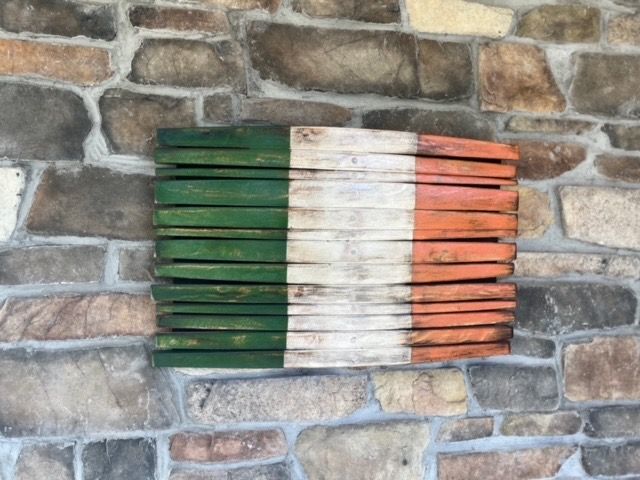Anthony Murphy.
Page Turner / Edited by Peter McDermott
Anthony Murphy has been in the newspaper industry his entire working career, as editor, copyeditor and graphic designer, and is currently with the Irish Farmers Journal. And then there are what he calls his hobbies.
It’s true that some of them would normally fall into that category. “I play music for the Drogheda Brass Band, where I am the principal euphonium player,” he said by way of example. “[And] I am a licensed radio amateur, with the call sign EI2KC. I can send and receive Morse code – an odd boast.”
But the word “hobby” is a bit of an understatement for his work as an author, and his specialist theme, the ancient myths, monuments and cosmology of the Boyne Valley, which he’s been writing about for almost 20 years.
Consider his latest, “Mythical Ireland: New Light on the Ancient Past,” which he said, “embodies the search for a soul among Ireland's ancient ruins, and is an attempt to retrieve something of deeper import from 5,000-year-old megalithic monuments and their associated myths.”
He added: “The book represents my own fascinating and engaging journey through time, landscape and the human spirit. Dealing with archaeology, interpretive mythography, cosmology and cosmogony, I attempt to grapple with a core meaning, something beyond the functional interpretations of academia. Along the way, the book delves into many enthralling aspects of this journey.”
Murphy continued: “‘Mythical Ireland’ represents a personal and yet universal journey, a quest to reimagine the monuments as empowering and transformative sacred places. The druids and poets of the Boyne are invoked and thus the sídhe of the ancient texts are reawakened for a modern and turbulent world.”
And did we mention that he did all of the beautiful photography for the volume?
Anthony Murphy
Date of birth: I was born in 1974 and turn 44 this year.
Place of birth: My home town of Drogheda, Co. Louth. I was born and raised here and continue to live here. It's a great town with great people.
Spouse: Ann. We will celebrate 20 years of marriage this year.
Children: We have five children – Amy, Luke, Josh, Tara and Finn.
Residence: A three-bed semidetached house in a housing estate in Drogheda.
Published works: “Island of the Setting Sun – In Search of Ireland's Ancient Astronomers,” 2006, The Liffey Press (with co-author Richard Moore); “Newgrange: Monument to Immortality,” The Liffey Press, 2012; “Land of the Ever-Living Ones,” a self-published novella, 2013; “The Cry of the Sebac,” 2014 (novel). “Mythical Ireland: New Light on the Ancient Past” 2017, The Liffey Press, published in the U.S., April 2018.
What is your writing routine? Are there ideal conditions?
I don't have a routine as such. I try to fit my writing in around my professional and family life. I work full-time in Dublin. When I am writing a book, I try to write at least a little every day. Even if it's only 50 words, it's progress towards completion. Sometimes I might write 300 words in an evening. Other times, when my flow is good, I can write 2,000 or 3,000 words in an evening.
It's surprising how much you can write that way, in brief intervals of your life. The ideal conditions are of course at the comfort of my desk here at home, when the house is quiet. Unsurprisingly, our house is a very rich and wonderful auditorium of noise, speech and the humdrum of busy family life. I wouldn't have it any other way. But it's nice to be able to concentrate properly on the writing task when the noise has died down in the evening and I can close over the door. When writing non-fiction, it is of course important to be close to my library of books. My non-fiction books contain comprehensive footnotes and references. I can type quite fast, so when I am at the computer I can get a lot written in a short time, except when I am writing a section that is heavily referenced. Then I have to open books and papers and create the bibliographical entry and any footnotes and references. It can be slow going at times.
What advice do you have for aspiring writers?
Try to write every day. If you find you have writer's block, or you cannot find the inspiration to write on a particular day, write about how you feel. Keep a diary if necessary. Write "through" your block. Don't force it. It will come. When writing a book, whether fiction or non-fiction, aim to write something every day. But only as much as you can manage without exhausting yourself.
I would say don't set a daily word count target. Creativity doesn't work to such a schedule. You will have good days and you will have less productive days.
The other advice is to read. Read as much as possible. I am forever buying books and forever dipping in and out of my library. I hardly ever read a book from cover to cover. I mostly read non-fiction, as I mostly write non-fiction.
And one more thing for non-fiction writers – always use references and footnotes, and include a bibliography. I refuse to read non-fiction books that don't have such things because they lack credibility. If you can't support what you're writing as a non-fiction writer, then write fiction!
Name three books that are memorable in terms of your reading pleasure.
“Jung and the Story of Our Time” by Laurens Van Der Post. This is one of the most enthralling biographies you'll ever read, and in fact is a beautiful work of prose which excellently describes one of the 20th century's greatest humans.
“The Stones of Time” by Martin Brennan. This book was hugely influential in my own work around the cosmology of the Boyne monuments. It was written by an American artist of Irish descent, Martin Brennan. Brennan made significant discoveries about the astronomical alignments of several ancient Irish monuments. In 2009, he accepted my invitation to be the keynote speaker at a conference in the Boyne Valley, returning to Ireland for the first time in 25 years.
“Cosmos” by Carl Sagan. One of the most inspiring reads of my teenage years. Sagan had a wonderful way of communicating awesome and sometimes complex or abstract concepts in the most enthralling way. He had a huge mind, vast as the cosmos.
What book are you currently reading?
Quite a few. I rarely read and finish one book at a time. Right now, I am reading “The Portable Jung,” edited by Joseph Campbell. I am also reading “Nostos,” the late John Moriarty's autobiography, albeit very slowly. It is difficult to read Moriarty from cover to cover in a short time. He was an incredible philosopher with a vast knowledge and a distinguished poetic ability. I am also trying to read “Irish Sagas” edited by Myles Dillon when I get the time.
Is there a book you wish you had written?
No. But I think there are many more books in me, and I look forward to writing them.
Name a book that you were pleasantly surprised by.
“Secrets of the Millionaire Mind” by T. Harv Eker. I am aware that there is a certain cynicism about self-help books, but this one really helped me. And there have been others. I am quite open-minded.
If you could meet one author, living or dead, who would it be?
I always thought that it would be nice to meet J.R.R. Tolkien. I loved “Lord of the Rings.” However, from what I've read about him he was quite an austere fellow and it might be the case that a conversation with him could be quite stilted or awkward. It would be much nicer, I think, to have shared a conversation with the likes of Joseph Campbell, Carl Sagan, John Moriarty or C.G. Jung. Getting all these around a table would be fascinating.
What book changed your life?
“Your Erroneous Zones,” by Wayne W. Dyer. Yes, another self-help book that actually helped me begin my journalistic career.
What is your favorite spot in Ireland?
The Boyne Valley. It is the location of the largest and most significant prehistoric monuments of Ireland, and also happens to be a beautiful place. It's the center of my universe.
You're Irish if...
You drink whiskey to get rid of a cold. You crack jokes at a funeral. You talk about the weather at least three times a day. You turn up to an 8 p.m. event at 8.30 p.m. because you know everyone else will too.
For more about Anthony Murphy’s work visit his website here and the Mythical Ireland channel on YouTube.










